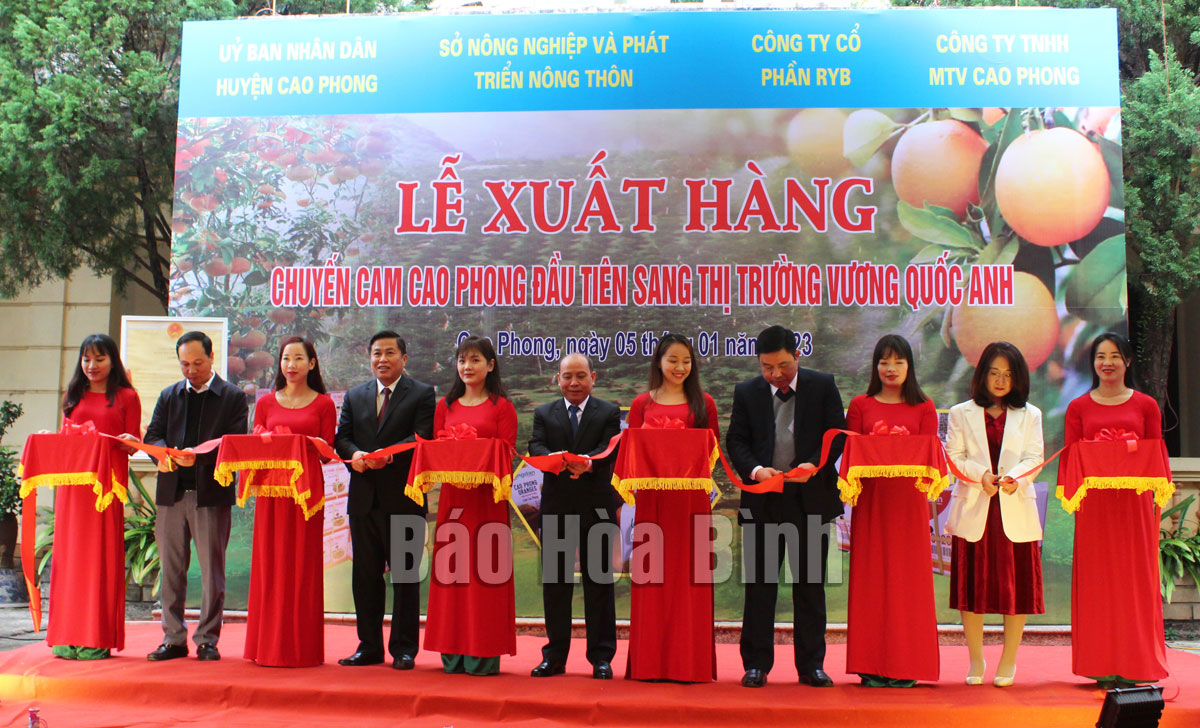



The leaders were cutting the ribbon to congratulate the first shipment of Cao Phong oranges to the UK market.
In Cao Phong district, orange trees were planted from the early 60s, by the end of the 70s of the twentieth century, the district’s oranges were exported to the former Soviet Union market. After more than 40 years (since 1980), Cao Phong oranges are again reaching out to the world market, with the event of exporting Cao Phong oranges to the UK market.
Through the analysis of Cao Phong orange samples, it has been found that all the samples tested do not detect any active ingredients of nearly 900 active plant protection drug substances that are required to be analyzed according to European standards. The sample packages sent to the UK are cleared without any problems with food safety and origin. Therefore, the first shipment of Cao Phong oranges with a total volume of about 7 tons has been officially exported to the UK market. This is a special mark, contributing to strongly promoting the brand of "Cao Phong Oranges” and encouraging orange growers in Cao Phong district.
At the delivery ceremony, the leader of Cao Phong district says: Currently, the area of oranges and tangerines in the whole district is about 1,358 hectares, the output is over 20 thousand tons a year, in which, many areas are produced according to VietGAP process. The quality is highly appreciated and favored by the market. After a period of implementing the solutions supporting the cooperatives, the cooperative groups have implemented the technical measures to improve the quality, the product designs, grant and manage the planting area codes... So far, the district's oranges are eligible for export to many high-end markets, including the UK market.
Making a speech at the ceremony, Mr. Bui Duc Hinh, the Deputy Secretary of the Provincial Party Committee, the Chairman of the Provincial People's Council congratulated Cao Phong district in general, including the people, the businesses, and the cooperatives growing Cao Phong oranges. He emphasizes: This is the first shipment of the agricultural products in the new year of 2023 to be exported, and this is also the first batch of Cao Phong oranges to be exported to the UK market. This event is of great significance, helping to encourage the spirit of the orange growers, stronger promoting the brand name of "Cao Phong oranges” - the only agricultural product of the province that has been granted the geographical indication protection.
The Deputy Secretary of the Provincial Party Committee, the Chairman of the Provincial People's Council has also discussed some more issues related to the efforts maintaining the stable quality of Cao Phong oranges and the solutions to improve the economic efficiency for the Cao Phong orange growing area. He has emphasized the belief that Cao Phong oranges will continue to reach far and conquer the domestic and foreign markets. He has suggested that Cao Phong district coordinate with the units, the businesses and the specialized forces to deploy the set of solution groups, successfully implementing the replanting of orange trees in Cao Phong district in the direction of increasing the added value and the sustainable development.
Mr. Bui Duc Hinh, thecDeputy Secretary of the Provincial Party Committee, the Chairman of the Provincial People's Council and the delegates were witnessing the shipment of Cao Phong oranges, which is about to be exported to the UK market.
The employees of Cao Phong One Member Limited Liability Company were transporting the orange boxes, being excited about the new market opportunities.